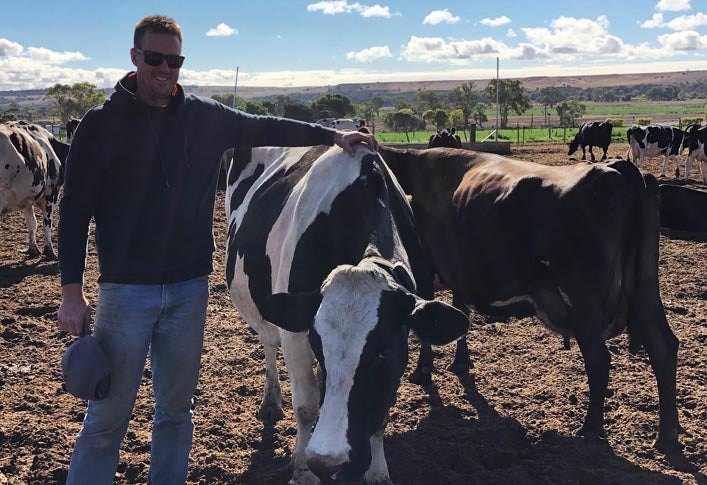Posted by on
27/04/2021
‘Wellness’ has emerged as much more than just a buzzword in recent years, underpinning healthy choices and quality of life – and the same can be said for dairy cattle.
Happy cows means better milk, with dairy herd comfort and welfare directly proportional to the quality of milk produced.
As such, the welfare of Sam Martin’s 350 strong milking herd on his South Australian dairy is paramount.
Sam runs the dairy together with his father Graham, and since returning to the Wall Flat district property seven years ago, has instigated a number of measures to ensure his Friesian milkers are living their best lives.
An initial development was the purchase of 350 heat detection activity collars, making sure any illness, such as mastitis, is picked up prior to the cow becoming visually distressed.
“The heat collars can detect when a cow is off her food, and immediately flags that there is an issue – we can pick up and treat unwell cattle, before they become visually sick and can instantly identify when cows are in heat, lactating, mating and calving,” he said.
A monthly visit from the vet also ensures his herd is assessed professionally, and regularly.
It’s this attention to detail that helped earn Sam the 2016 Lion Dairy Farmer of the Year, but he certainly hasn’t rested on his laurels.
In more recent years the operation has undergone a vast re-development, with cattle now lot fed using custom feeding pads and the added addition of a mixer wagon just some of his latest investments.
Fields have also been renovated, with irrigation pumps recently installed across the flood plains guaranteeing high water flows, and underpinning a change in cropping direction.
“We can now grow crops that better utilise the land and generate more tonnage. We’ve recently harvested our first maize crop, and will integrate more lucerne and barley over rye grass and millet.”

The operation is working towards growing all the herd’s feed on-farm, for genuine traceability and to provide consumers with trusted, quality dairy products.
“We don’t grow 100 percent of our feed mix here, but what we don’t produce we source locally from people we know personally – we like to support our neighbours and our neighbours like to support us so we can all be rest-assured we’re contributing to a higher quality end-product.”
The new feed mixer and feed pad further guarantee the cows’ nutritional needs are met, and that optimal milk composition is achieved.
“The consistency of the new system is phenomenal, we now know that every cow is getting the minerals, fats and nutrients they need, with all the feed inputs tested for protein, nutrients and fibre, in conjunction with our nutritionist.”
The Martins’ cows are milked twice a day in their 26-a-side herringbone dairy, with each cow producing about 29 litres per day.
Milk from the dairy is sent to Beston Pure Foods in Murray Bridge, where it is largely used to produce cheese.
“Our product is grown and produced all right here in The Murraylands, and we’re really proud to provide a genuine paddock to plate consumer experience.”
Milk from the dairy is further tested for its fat, protein and somatic cell count in the Beston factory – the somatic cell count a measure widely used for evaluating milk quality.
The lower the cell count, the greater the cow health, with the Martins’ herd’s somatic cell count consistently below the required 200,000 cells/ml.
“Knowing that we are exceeding our benchmarks is heartening, but it’s in everyone’s best interest for our dairy cows to be well cared for – it’s good for the cows, good for business and good for cheese lovers across Australia,” Sam said.
